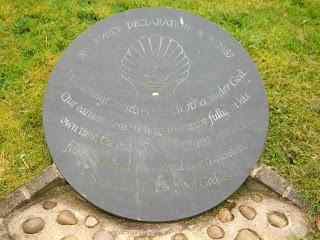Could Churches in your area arrange a meeting with the candidates for your local Council election?
A meeting of regional representatives from the West Midlands Region Churches Forum met on 15 February to identify questions that can be asked prospective candidates in the run up to the May Local Elections. Last year, churches were highly successful in providing space for General Election Hustings. The WM Region Churches Forum encourages local Churches across the region to consider organising a Husting for the Council Elections in May. The questions below are offered as a framework.
Briefing
The range of questions appropriate for a local election will be different from those for a general election. As the responsibility of local authorities are more localised and community orientated than that of Westminster Government, questions should focus on a) locally based issues, b) candidate’s knowledge of the community they wish to serve, and c) their willingness to listen and build trust with people if they are elected.
A husting is an ideal opportunity to observe the way in which candidates listen and dialogue with their audience and for them to show they are interested in building mutual accountability and trust. The following questions are offered as starters for a debate with candidates and are aimed at revealing their ability to listen and engage with an audience.
Partnership between Council and local community
- What is your vision and understanding of a local community?
- How will you go about consulting with the people of this community and listen to their voices?
- What will you do to build trust and develop partnership between the Council and the people of this community?
- In what ways will you help this community to develop its corporate voice?
- In what ways will you help the Council to listen to the voice of our community?
- How will you balance views of the majority when they conflict with legitimate concerns of minority groups?
- What do you know about the voluntary and community sector in this community?
- What value do you place on the contribution of voluntary and community groups?
- What support for the voluntary and community sector will you fight for, if you are elected?
Cuts
- What areas will you prioritise for cuts and further efficiencies in the next 2 year’s local authority budgets of 2012 and 2013? (Although reductions for 2011/12 are set, further reductions will be required in 2012 and 2013).
- Do you think that further efficiencies can be gained through improved working methods, and if so in what ways?
- What do you think about sharing services with neighbouring councils as a way of reducing costs and improving services?
- How will you be sensitive to the human cost of reorganisation that involve staff redundancies, relocation and establishing new offices?
- How will you assist and enable our local community to organise itself?
- What do you understand by the term, Big Society?
- How will you support initiatives for community organising?
- How will you help to inform national government and local MPs of our issues?
- How will you go about learning of best practice in neighbouring councils?
- How will you liaise between the different strands and departments of Council and manage your relationship with the employed staff of the Council?
- To what extent do you feel bound by the national policies of your party?
These are your local questions relevant to the needs of your local community
General Questions
- What world-view informs your politics?
- What issue would lead you to defy your party on a vote in the Council chamber?
- What social action projects will you assist or put into place?
- What do you understand to be the limits of your powers if you are elected?


